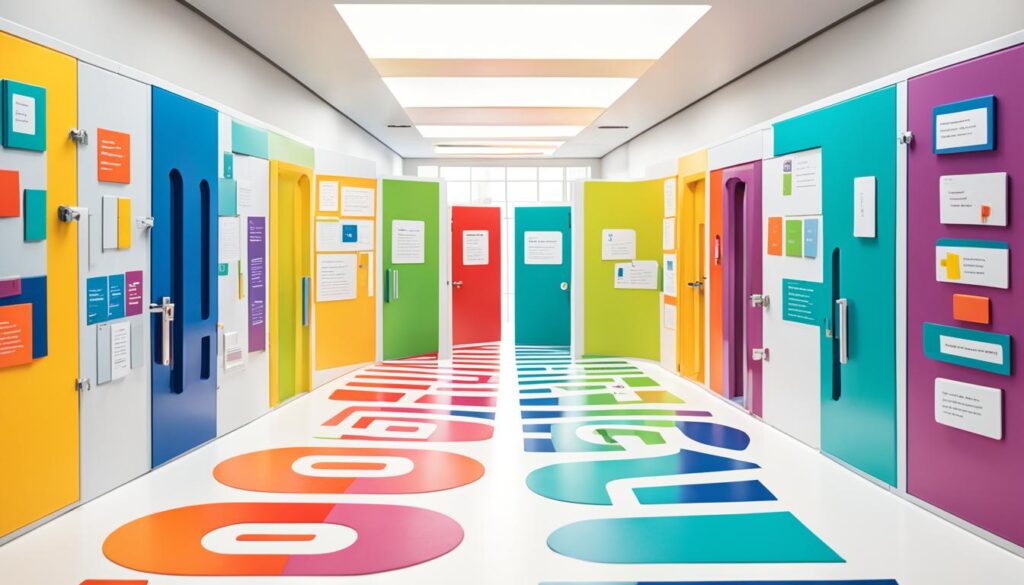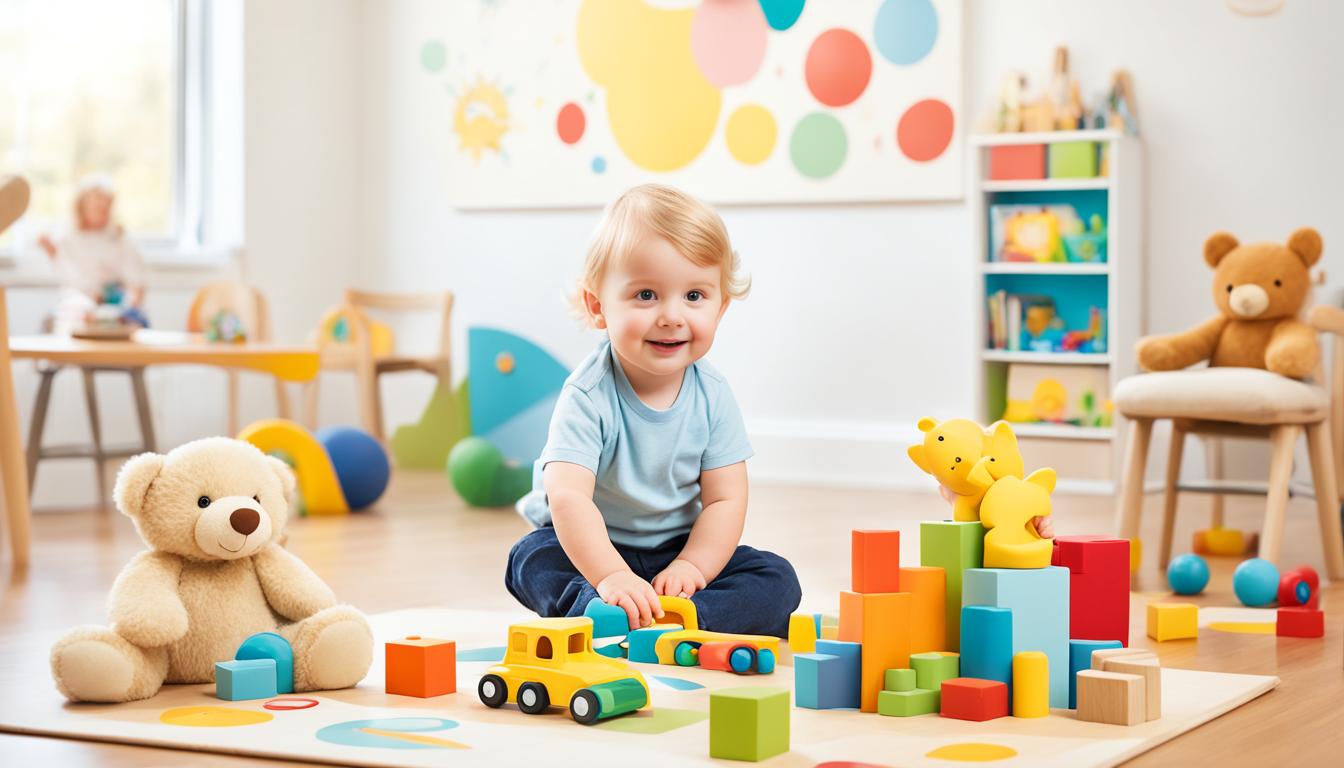A Bachelor of Early Years Education (B.E.Y.E.) degree offers various pathways and career opportunities in the field of early childhood education. This degree program focuses on equipping individuals with the necessary skills and knowledge to work with young children and contribute to their development. It offers specialized courses in early childhood education, preparing graduates for a range of careers in preschools, daycare centers, and other educational settings. With a B.E.Y.E. degree, individuals can pursue careers as preschool teachers, childcare center directors, early childhood program officers, and more. The program curriculum includes courses on child development, curriculum planning, behavior management, and parent involvement activities, ensuring graduates are well-prepared for the responsibilities of working with young children.
Table of Contents
ToggleKey Takeaways:
- A Bachelor of Early Years Education (B.E.Y.E.) degree provides pathways to various careers in early childhood education.
- Graduates can work as preschool teachers, childcare center directors, and early childhood program officers, among other roles.
- The program curriculum includes courses on child development, curriculum planning, behavior management, and parent involvement activities.
- Individuals with a B.E.Y.E. degree are equipped with the necessary skills and knowledge to work effectively with young children.
- Career opportunities in preschools, daycare centers, and other educational settings are available with a B.E.Y.E. degree.
Career Opportunities in Early Childhood Education
A Bachelor of Early Years Education (B.E.Y.E.) degree opens up numerous career opportunities in the field of early childhood education. Graduates can pursue various roles that involve working closely with young children and contributing to their early education and development.
Preschool Teacher
With a B.E.Y.E. degree, you can become a preschool teacher and create a nurturing and stimulating learning environment for young children. As a preschool teacher, you will design age-appropriate curriculum, facilitate engaging activities, and foster social and emotional growth.
Kindergarten Teacher
As a kindergarten teacher, you will play a crucial role in preparing children for their educational journey. Your responsibilities will include teaching basic academic skills, fostering social interactions, and guiding children in their developmental milestones.
Elementary School Teacher
A B.E.Y.E. degree can also pave the way for a career as an elementary school teacher. You will teach a range of subjects and mentor students in their academic and personal growth. Your role as an elementary school teacher will shape the foundation of a child’s educational journey.
Childcare Center Director
If you prefer a leadership role, becoming a childcare center director might be the right path for you. As a director, you will oversee the operations of a childcare center, develop curriculum frameworks, manage staff, and ensure a safe and enriching environment for children.
Special Education Teacher
Another rewarding career option in early childhood education is becoming a special education teacher. With specialized training and knowledge, you will work with children who have diverse learning needs, providing individualized support and fostering inclusive educational environments.
School Counselor or Psychologist
Utilizing your B.E.Y.E. degree, you can pursue a career as a school counselor or psychologist. In this role, you will support children’s emotional well-being, provide guidance, and advocate for their educational and personal development.
Specializing in a specific area of early childhood education, such as infant and toddler development or special education, can further enhance your career prospects and open up opportunities for advancement. By focusing on a specialization within the field, you can deepen your expertise and make a significant impact on the lives of young children.
Explore the diverse career pathways that a Bachelor of Early Years Education (B.E.Y.E.) degree offers and contribute to the growth and development of the next generation.
Benefits of Pursuing a Bachelor of Early Years Education
Pursuing a Bachelor of Early Years Education (B.E.Y.E.) degree offers several benefits for individuals interested in a career in early childhood education. The program provides a comprehensive curriculum that covers a wide range of topics related to child development, educational theories, and teaching strategies.
Students gain practical experience through internships or practicums, allowing them to apply their knowledge in real-world settings. This hands-on experience helps develop essential skills in planning and implementing developmentally appropriate activities, managing behavior, and fostering positive relationships with children and their families.
Additionally, a B.E.Y.E. degree often includes courses on cultural diversity, inclusion, and advocacy, preparing graduates to work effectively with diverse populations of children and families.
| B.E.Y.E. Program Benefits: | |
|---|---|
| Comprehensive Curriculum | The program covers a wide range of topics, including child development, educational theories, and teaching strategies, ensuring graduates have a strong foundation in early childhood education. |
| Practical Experience | Internships and practicums provide hands-on experience, allowing students to apply their knowledge in real-world settings and develop essential skills in planning, managing behavior, and building relationships. |
| Cultural Diversity and Inclusion | Courses on cultural diversity, inclusion, and advocacy prepare graduates to work effectively with diverse populations of children and families, fostering an inclusive and supportive learning environment. |
By pursuing a B.E.Y.E. degree, individuals can gain the necessary knowledge, skills, and practical experience to make a positive impact on children’s lives and contribute to their holistic development. Whether aspiring to become a preschool teacher, childcare center director, or advocate for early childhood education, a B.E.Y.E. degree opens up rewarding career opportunities in the field.
Requirements for Bachelor of Early Years Education Programs
Bachelor of Early Years Education (B.E.Y.E.) programs have specific admission requirements in place to ensure that students are prepared for the challenges of the program. To enroll in a B.E.Y.E. program, you typically need:
- A high school diploma or equivalent
- Letters of recommendation
- A personal statement
- An interview
Once accepted into the program, you will need to complete a designated number of credit hours, which include:
- Core courses in early childhood education
- General education courses
- Electives
In addition to coursework, practical experience is crucial in early childhood education programs. As part of your studies, you may be required to engage in fieldwork or practicum experiences to gain hands-on teaching skills. These experiences provide invaluable opportunities to apply your knowledge in real-world settings and make a positive impact on young children’s lives.
Some B.E.Y.E. programs may also require you to pass a comprehensive exam or complete a capstone project before graduating. This ensures that you have a comprehensive understanding of the concepts and principles learned throughout the program.
By meeting these requirements, you will be well-prepared to embark on a rewarding career in early childhood education.
Career Advancement and Continuing Education Options
Graduates with a Bachelor of Early Years Education (B.E.Y.E.) degree have numerous opportunities for career advancement and continuing education in the field of early childhood education. Expanding your knowledge and skills not only enhances your career prospects but also allows you to make a greater impact on the lives of young children.
One common path for career advancement is pursuing advanced degrees. Many professionals choose to further specialize in a specific area of early childhood education by earning a Master’s degree or a Ph.D. These advanced degrees provide in-depth knowledge and research opportunities, allowing you to become an expert in your chosen field. Moreover, advanced degrees can qualify you for leadership positions in educational institutions, such as becoming a director of an early childhood program or leading curriculum development initiatives.
Continuing education courses and professional development opportunities are also valuable options for career growth. These courses enable you to stay updated with the latest research, teaching methodologies, and best practices in early childhood education. By participating in workshops and conferences, you can network with other professionals, share ideas, and gain new perspectives on early childhood education.
Earning a Bachelor of Early Years Education degree is just the beginning of a lifelong learning journey. Ongoing professional development is essential for staying current in this dynamic field and continuing to provide high-quality education to young children.
By engaging in professional development activities, you can deepen your understanding of child development, learn innovative teaching strategies, and expand your repertoire of skills. This ongoing learning process will equip you with the tools and knowledge needed to adapt to new challenges and changes in the field.
Benefits of Continuing Education in Early Childhood Education
- Stay updated with the latest research and advancements in early childhood education
- Expand your knowledge of child development theories and practices
- Acquire new teaching strategies and techniques
- Network with other professionals in the field
- Enhance your career prospects and opportunities for advancement
Continuing education is an investment in your professional growth and the future of early childhood education. By continuously updating your skills and knowledge, you are better equipped to meet the evolving needs of young children and provide them with the best possible educational experiences.
Remember, your journey as an early childhood educator doesn’t stop at graduation. It is a lifelong commitment to learning, growth, and making a positive impact on the lives of young children.

Conclusion
A Bachelor of Early Years Education (B.E.Y.E.) degree provides individuals with a solid foundation in early childhood education and prepares them for a fulfilling career working with young children. Graduates of this program have a wealth of career opportunities in various educational settings. With their B.E.Y.E. degree, they can become preschool teachers, childcare center directors, or professionals in other roles that contribute to the development and education of young children.
Obtaining a B.E.Y.E. degree equips individuals with the necessary knowledge and skills to create engaging and developmentally appropriate learning environments for children. The comprehensive curriculum covers key topics such as child development, curriculum planning, behavior management, and parent involvement. This holistic approach ensures that graduates are well-prepared to meet the needs of children and their families.
In addition to immediate career prospects, a B.E.Y.E. degree offers opportunities for further specialization and advancement. Graduates can choose to pursue advanced degrees or certifications to specialize in areas such as special education, infant and toddler development, or educational leadership. Continuing education courses and professional development opportunities allow individuals to stay updated with the latest research and best practices in early childhood education, enhancing their knowledge and expertise.
FAQ
What is a Bachelor of Early Years Education (B.E.Y.E.) degree?
A Bachelor of Early Years Education (B.E.Y.E.) degree is a program that focuses on equipping individuals with the necessary skills and knowledge to work with young children and contribute to their development.
What are the career opportunities in early childhood education with a B.E.Y.E. degree?
Graduates with a B.E.Y.E. degree can pursue careers as preschool teachers, childcare center directors, early childhood program officers, and more.
What are the benefits of pursuing a Bachelor of Early Years Education?
Pursuing a B.E.Y.E. degree provides a comprehensive curriculum and practical experience, preparing graduates for the responsibilities of working with young children.
What are the requirements for Bachelor of Early Years Education programs?
The admission requirements for B.E.Y.E. programs may include a high school diploma or equivalent, letters of recommendation, a personal statement, and an interview. Once accepted, students are required to complete core courses and may need to complete fieldwork or practicum experiences.
What are the career advancement and continuing education options with a B.E.Y.E. degree?
Graduates can pursue advanced degrees, such as a Master’s degree or Ph.D., specialize in a specific area of early childhood education, or engage in ongoing professional development opportunities.

